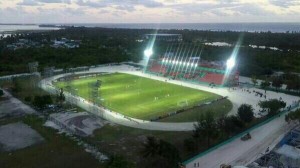“I think one small country in football taking on something like the Challenge Cup is something very remarkable.”
Speaking ahead of the Maldives opening Group A with tournament outsiders Myanmar this evening, Assistant Secretary General of the Football Association of Maldives Mohamed Nasir pointed out the logistical novelty of an international football tournament in Asia’s smallest country.
“I’m not sure there’s another tournament where land, sea, and air transport is involved in day to day player movements.”
Games will take place in both the capital Malé and the country’s second city Addu, with players from the eight competing teams staying in Bandos and Herathera resorts.
The biggest football tournament to have previously taken place in the country was the 2008 South Asian Football Federation championship – held jointly with Sri Lanka – which the Maldives won, beating regional heavyweights India in the final.
The National Stadium in Malé will host Group A’s games, featuring tonight’s teams as well as Palestine, and Kyrgyzstan – who played this afternoon, Palestine taking a one-nil victory.

The renovated – and renamed – Addu Football Stadium in Hithadhoo will host Turkmenistan, Laos, the Philippines, and Afghanistan in Group B, with the first game tomorrow at 4pm.
As AFC Cup fever grips the country, President Abdulla Yameen has already pledged MVR1 million to the national team should they reach the semi-finals.
Nasir, however, argued that a far more precious reward was on offer should the Maldives win the biennial tournament, with automatic qualification for the 2015 Asian Cup for team left holding the trophy on May 30.
“I think this is one the best things the FA has done to take us to the next level, as we are one step closer to the biggest tournament in Asia and we are pretty optimistic that we have a good chance to qualify,” said Nasir.
Part of the Asian Football Confederation’s ‘Vision Asia’ programme, the AFC Challenge Cup was introduced in 2006 with the aim of providing competition experience to the continent’s smaller footballing nations.
The four previous tournaments were won by Tajikstan, then India, before North Korea won both the 2010 and 2012 editions. The Maldives appeared in the latter tournament, going out at the group stage after defeats to both Turkmenistan and Palestine.
While Afghanistan go into the tournament as the highest ranked team, local media has this afternoon reported that many locals will be throwing their support behind Palestine.
The Maldives Palestine Brotherhood Association told Sun Online today that, while wanting the Maldives to win, it would be supporting Group A rivals today in a show of support for the Palestinian people.
With high demand leading to the black market trading of tickets, police have today warned action will be taken against touts operating in the vicinity of the stadiums during the tournament.
The police also advised everyone to refrain from racist or defamatory remarks towards players or officials during the cup.
“If such a matter is brought to the attention of the police, we will take necessary action against it. Spectators attending to watch the match are also advised to conduct acts of support within the spirits of the sport,” read a police statement today.

Minister of Tourism Mohamed Maleeh Jamal echoed the police’s comments while unveiling the competition’s offici
al mascots – twodolphins whose tour of the city this afternoon was accompanied by the AFC Cup song,
President Yameen has previously expressed his hope that the tournament will unite those in the country divided by politics, asking all citizens to proudly wear the national team jersey.
“I hope all Maldives is in red colours this evening,” said Nasir. Tonight’s game kicks off at 9pm.